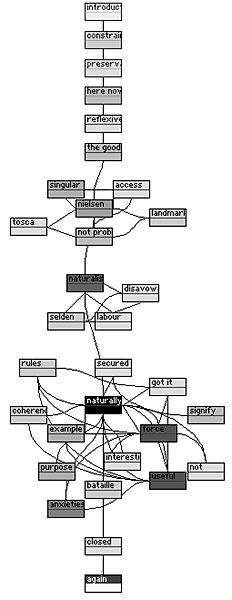
|
Use value is a concept that privileges the instrumental as a key quality of function, action, and work -- in whatever way we wish to conceive of work. The manner in which I'd like to characterise it, and the contexts I have in mind for its use are in terms of a radical appropriation of Bataille's ideas of the general and restricted economy.
Bataille, in the opening chapter of the first volume of The Accursed Share, argues for a distinction between a restricted and a general economy. A restricted economy is one which no matter what is expended (for instance time, capital, energy, or meaning) an assumption about a return on that expenditure determines how that 'transaction' is performed and understood.
A general economy, on the contrary, is one in which no matter what the terms of expenditure (time, capital, energy, meaning), no return is envisaged from however this activity or transaction is performed. Bataille in his own fiction writing, and in that of those writers and poets which he celebrated, tended towards a writing practice that approached a general economy.
Realism, in seeking to conceal its own processes of production, is, in effect, subject to a restricted economy where the play or flow of language (and pleasure, narrative, meaning, sense, taste, and so on) is recovered. Closure, meaning, and the minor pleasures attached are assumed and expected as the outcome and meaning of the work. Writing (and literature) as a wanton, productive, active, and singular event is domesticated into the already known and the stability of the secure and repeatable.
Hypertext theory's assumptions about usability, and what I've characterised as the domestication of the link, fall within a restricted economy. Here the moment of risk that the link is becomes a point of excess that cannot be accommodated by a semiotic (or any other) economy that first regards the task or role of the link (or of writing) as enabling order and coherence, as is the case with hypertext theory's emphasis on usability.
|